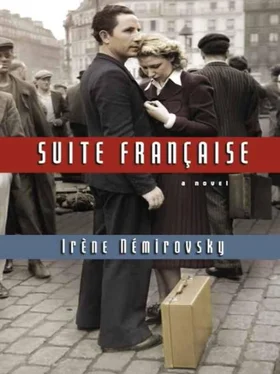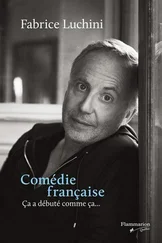There were other sounds as well: the steady thud of explosions, rising and bursting forth like flowers and, when the noise stopped, the rattling of every window-pane in the village, the banging of shutters being opened and closed, anxious words flying from window to window. At first, the cat had started every time he heard an explosion, his tail stiff, his fur bristling, his whiskers tense with fear. But he had got used to the way the rumble came closer and closer, no doubt imagining it was thunder. He leapt about in the flower beds, pulled the petals off a rose with his claws (the rose was in full bloom; the slightest breeze could destroy it; its white petals would fall to the ground, like soft, sweet-smelling rain). Suddenly, as quick as a squirrel, the cat darted up a tree, ripping the bark with his claws. Terrified birds flew off. At the end of a branch he began a savage, arrogant dance, taunting in his bold, warlike way, the sky, the earth, the animals, the moon. Now and again he opened his deep, narrow mouth and let out a piercing miaow, a sharp, provocative call to all the cats nearby.
The birds in the henhouse and the dovecote all woke up and hid their heads beneath their wings, catching the scent of fate and death; a small white hen tentatively climbed on to a metal drinking trough, knocked it over and rushed away, making terrified screeching noises. But the cat had jumped on to the ground now. He stood motionless… waiting. His round golden eyes shone in the darkness. There was the sound of leaves rustling and he came back carrying a small dead bird in his mouth, his tongue slowly lapping at its wound. Eyes closed, he savoured the warm blood. He had plunged his claws into the bird's heart and clenched and unclenched his talons, digging deeper and deeper into the tender flesh that covered its delicate bones with slow and rhythmical movements until its heart stopped beating. He ate the bird slowly, then licked himself clean, polishing the tip of his beautiful bushy tail, which was moist and shiny from the damp night air. He was feeling benevolent now: when a shrew darted between his legs he let it go; he was content merely to swipe at a mole's head, leaving it only half dead, a trail of blood on its muzzle. He studied the mole with a scornful trembling of his nostrils but didn't touch it. A different kind of hunger had arisen within him; he arched his back, raised his head and miaowed again, a call that ended in a harsh, imperious cry. An old red pussycat suddenly appeared on the roof of the henhouse, basking in the moonlight.
The short June night was fading. The stars grew paler, the air smelled of milk and moist grass; now, half-hidden behind the forest, only the pink tip of the moon could be seen, growing dimmer and dimmer in the mist. Tired, triumphant and covered in dew, the cat gnawed on a sprig of grass, then slipped back into Jacqueline's room, on to her bed, looking for that warm spot near her thin feet. He was purring like a kettle on the boil.
A few seconds later, the arsenal exploded.
The arsenal exploded and the horrible echo of the explosion had only just stopped (the air all around them shook; all the doors and windows were vibrating and the small wall at the cemetery crumbled) when a long flame shot up, whistling, from the bell tower. The noise of the incendiary bomb had merged with the explosion of the arsenal. In a second, the entire village was in flames. There was hay in the barns, straw in the lofts. Everything caught fire. Roofs caved in, floors cracked in half; the refugees rushed into the streets while the villagers ran to open the cowsheds and stables to save the animals. The horses were neighing, rearing, terrified by the intensity of the noise and fire; they refused to come out and beat their heads and hoofs against the burning walls. A cow rushed by, bellowing in pain and terror as it frantically tried to shake a bale of burning hay from its horns; pieces of glowing straw flew everywhere. In the garden, the blossoming trees were bathed in a red-as-blood light. Normally, the firemen would have come and people would have calmed down, once the initial fear had passed. But this disaster, happening after so many others, was more than they could bear. Also, they knew the firemen had received orders to leave with all their equipment three days before. They felt hopeless. "If only the men were here," cried the women, "the men!" But the men were far away and the children were running, screaming, rushing about, causing even greater confusion.
The refugees were howling in terror. Among them were the Péricands, half-dressed, faces dirty, hair dishevelled. It was the same as when the bombs had fallen on the road: everyone was shouting at once, calling to one another, and the voices all merged into one-the village was reduced to a roar. "Jean!," "Suzanne!," "Mummy!," "Grandma!" No one replied. A few youngsters who had managed to get their bicycles out of the burning sheds pushed them violently through the crowd. Yet, oddly enough, everyone believed that they were remaining calm, that they were behaving exactly as they should. Madame Péricand was holding Emmanuel in her arms, Jacqueline and Bernard were clutching her skirt (Jacqueline had even managed to get the cat back into his basket when her mother had pulled her out of bed and she now gripped it tightly to her). "The most precious things have been saved!" Madame Péricand said to herself over and over again, "Thank you God!" Her jewellery and money were sewn into a suede pouch pinned inside her blouse and she could feel it against her chest as she ran. She'd had the presence of mind to grab her fur coat and the small overnight case full of the family silver, which she'd kept beside her bed. She had her children, her three children! Sometimes a thought shot through her, as sharp and rapid as lightning, of her two older sons, in danger, far away: Philippe and that mad Hubert. She'd been desperate when Hubert ran away, yet rather proud of him. His behaviour had been irrational, wild, but manly. For them, Philippe and Hubert, she could do nothing, but her three little ones! She had saved her three little ones! She was sure she'd had a premonition the night before; she'd put them to bed half-dressed. Jacqueline didn't have a dress on but a jacket covered her naked shoulders; she wouldn't be cold; it was better than wearing just a blouse; the baby was wrapped up in a blanket; Bernard even had his beret on. She herself had no stockings, just red slippers on her bare feet, but gritting her teeth, arms tight round the baby, who wasn't crying but whose eyes were rolling wildly with fear, she made her way through the panic-stricken crowd, without the slightest idea where she was going. The sky above seemed filled with countless planes (there were two) flying back and forth with their evil buzzing, like hornets.
"Please don't let them bomb us any more! Please don't let them bomb us any more! Please…" These words went round and round endlessly in her bowed head. Out loud she said, "Don't let go of my hand, Jacqueline! Bernard, stop crying! You're behaving like a girl! There, there, baby, don't worry, Mummy's here!" She said these words mechanically, while silently continuing to pray: "Please don't let them bomb us any more! Let them bomb anyone else, dear God, but not us! I have three children! I have to save them! Please don't let them bomb us any more!"
They finally made it out of the narrow village street; she was in the open countryside; the fire was behind her; the flames fanned out across the sky. Scarcely an hour had passed since dawn, when the bomb had struck the bell tower. They were passed by car upon car fleeing Paris, Dijon, Normandy, the Lorraine region, France itself. The people inside them were numb. Sometimes they raised their heads to look at the fire in the distance, but their faces were indifferent. They had seen so many things…
Читать дальше

![Константин Бальмонт - Константин Бальмонт и поэзия французского языка/Konstantin Balmont et la poésie de langue française [билингва ru-fr]](/books/60875/konstantin-balmont-konstantin-balmont-i-poeziya-francuzskogo-yazyka-konstantin-balmont-et-thumb.webp)










